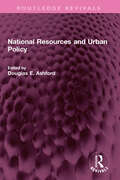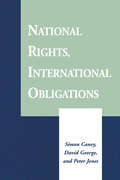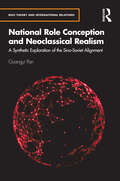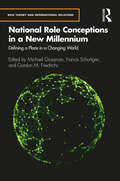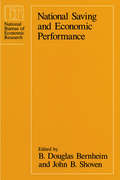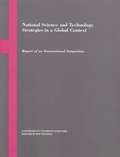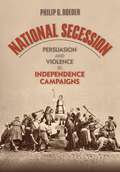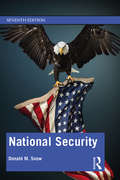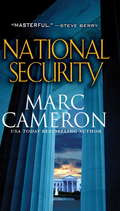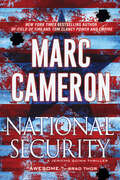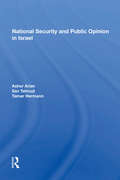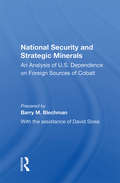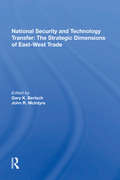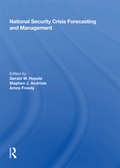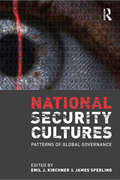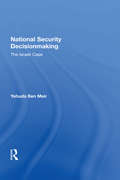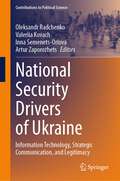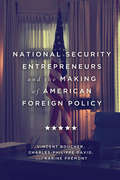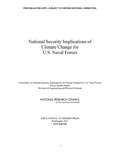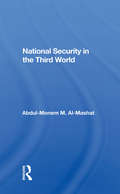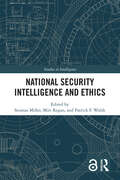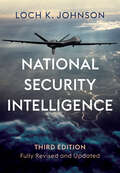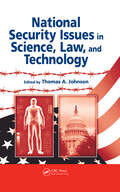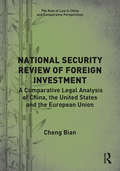- Table View
- List View
National Resources and Urban Policy (Routledge Revivals)
by Douglas E. AshfordFirst published in 1980 National Resources and Urban Policy critically examines how resource constraints affect urban development and urban policy making. With case studies from the United States, several European countries and Japan it brings themes like federal assistance programs; local government revenues; urban resources, the American capital market, and federal programs; urban investment controls in Britain; local government investment expenditures in West Germany; Japan confronts its cities; New York City fiscal crisis; public housing in metropolitan London; and restructuring the resource flow. This book is a must read for scholars and researchers of urban politics, public administration, urban studies, public policy and political studies.
National Rights, International Obligations
by Simon CaneyNationalism is once again rising and spreading. Nationlist movements are active throughout the world, demanding political recognition of their nations' identity. Yet the current revival of nationalism has taken place alongside claims that nation-states are becoming obsolete in an increasingly globalized world. In addition, now perhaps more than ever, people are conscious of humanity as a whole and are ready to take seriously the international dimensions of morality.In this collection of timely essays, distinguished moral and political philosophers examine issues raised by the competing claims of nationhood and internationalism from a variety of perspectives, and defend a variety of answers. Questions discussed include: Is humanity really divided into nations or are nations invented by nationalists? Does a nation have the right to be self-determining? If so, must each nation form a separate and sovereign state? Do our obligations stop at national boundaries? Do we not have obligations to human beings as such? Why then should we be less concerned about ?foreigners? than about our compatriots? Can we be concerned for social justice within societies yet not across the world as a whole? If we embrace ideas of human rights and global obligations, how do we establish what those rights and obligations actually are? Is it proper, plausible, or practical to aspire to such universal moral principles in a world characterized by national diversity and cultural difference?
National Role Conception and Neoclassical Realism: A Synthetic Exploration of the Sino-Soviet Alignment (Role Theory and International Relations)
by Guangyi PanDespite China’s alignment with Russia being one of the most significant factors shaping the international order, the dynamics of their historic relationships and, more importantly, the sources of China’s alignment policy remain underexplored. In this book, National Role Conception and Neoclassical Realism, a synthetic exploration into the Sino-Soviet alignment, Guangyi Pan investigates this question by analysing the changes in China’s national role conception from a cross-level perspective.Adding value to existing scholarly works on China’s decision-making logic, he examines two critical and dramatic moments in the history of Beijing’s alignment policy towards Moscow: the Sino-Soviet split in the 1960s and the normalisation in the 1980s. Based on massive historic documents and archives, he argues that the evolution of Beijing’s approach to aligning with Moscow results from its changing perception of China’s role in the world platform, especially its role relationship with the Soviet Union. The fundamental logic lies in how China positions itself, with the Soviet Union long serving as a mirror reflecting Beijing’s desired roles during pivotal transformations. By developing a more rigorous and coherent framework to analyse role conceptions, Guangyi Pan explores unit-level factors – including leader images, elite cohesion and political culture – alongside the impact of systemic stimuli. This approach constructs the complex process of role formation, evolution, performance and policy outcomes, offering a comprehensive understanding of China’s alignment with Russia throughout modern history.Aimed primarily at scholars whose research fields include international relations theory, the Cold War history and politics of China, National Role Conception and Neoclassical Realism may also be of interest to foreign policymakers, students and political history enthusiasts.
National Role Conceptions in a New Millennium: Defining a Place in a Changing World (Role Theory and International Relations)
by Michael GrossmanNational Role Conceptions in a New Millennium examines the transformation of the international system through an examination of the role conceptions adopted by the different global actors. Advancing current role theory scholarship in International Relations, the contributors take as their starting point the question of how international actors are responding to the reordering of the global system. They reflect on the rise of new actors and the reemergence of old rivalries, the decline of established norms, and the unleashing of internal political forces such as nationalism and parochialism. They argue that changes in the international system can impact how states define their roles and act as a variable in both domestic and international role contestations. Further, they examine the redefinition of roles of countries and the international organizations that have been central to the US and western dominated world order, including major powers in the world (the US, Russia, China, Britain etc.) as well as the European Union, NATO, and ASEAN. By looking at international organizations, this text moves beyond the traditional subjects of role theory in the study of international relations, to examine how roles are contested in non-state actors. National Role Conceptions in a New Millennium is the first attempt to delve into the individual motivations of states to seek role transition. As such, it is ideal for those teaching and studying both theory and method in international relations and foreign policy analysis.
National Saving and Economic Performance
by John B. Shoven B. Douglas BernheimThe past decade has witnessed a decline in saving throughout the developed world—the United States has the dubious distinction of leading the way. The consequences can be serious. For individuals, their own economic security and that of their families is jeopardized. For society, inadequate rates of saving have been blamed for a variety of ills—decreasing the competitive abilities of American industry, slowing capital accumulation, increasing our trade deficit, and forcing the sale of capital stock to foreign investors at bargain prices. Restoring acceptable rates of saving in the United States poses a major challenge to those who formulate national economic policy, especially since economists and policymakers alike still understand little about what motivates people to save. In National Saving and Economic Performance, edited by B. Douglas Bernheim and John B. Shoven, that task is addressed by offering the results of new research, with recommendations for policies aimed to improve saving. Leading experts in diverse fields of economics debate the need for more accurate measurement of official saving data; examine how corporate decisions to retain or distribute earnings affect household-level consumption and saving; and investigate the effects of taxation on saving behavior, correlations between national saving and international investment over time, and the influence of economic growth on saving. Presenting the most comprehensive and up-to-date research on saving, this volume will benefit both academic and government economists.
National Science and Technology Strategies in a Global Context: Report of an International Symposium
by National Academy of Engineering Staff National Academy of Sciences Staff Government-University-Industry Research Roundtable Staff Institute of Medicine (U.S.) StaffA report on the National Science and Technology Strategies in a Global Context
National Secession: Persuasion and Violence in Independence Campaigns
by Philip G. RoederHow do some national-secessionist campaigns get on the global agenda whereas others do not? Which projects for new nation-states, Philip Roeder asks, give rise to mayhem in the politics of existing states? National secession has been explained by reference to identities, grievances, greed, and opportunities. With the strategic constraints most national-secession campaigns face, the author argues, the essential element is the campaign's ability to coordinate expectations within a population on a common goal—so that independence looks like the only viable option.Roeder shows how in most well-known national-secession campaigns, this strategy of programmatic coordination has led breakaway leaders to assume the critical task of propagating an authentic and realistic nation-state project. Such campaigns are most likely to draw attention in the capitals of the great powers that control admission to the international community, to bring the campaigns' disputes with their central governments to deadlock, and to engage in protracted, intense struggles to convince the international community that independence is the only viable option.In National Secession, Roeder focuses on the goals of national-secession campaigns as a key determinant of strategy, operational objectives, and tactics. He shifts the focus in the study of secessionist civil wars from tactics (such as violence) to the larger substantive disputes within which these tactics are chosen, and he analyzes the consequences of programmatic coordination for getting on the global agenda. All of which, he argues, can give rise to intractable disputes and violent conflicts.
National Security
by Donald M. SnowThe seventh edition of this highly successful textbook analyzes the history, evolution, and processes of national security policies. It examines national security from two fundamental fault lines - the end of the Cold War and the evolution of contemporary terrorism dating from the 9/11 terrorist attacks - and traces their path up to ISIS and beyond. The book considers how the resulting era of globalization and geopolitics guides policy. Placing these trends in conceptual and historical context and following them through military, semimilitary, and nonmilitary concerns, National Security treats its subject as a nuanced and subtle phenomenon that encompasses everything from the global to the individual with the nation at its core. New to the Seventh Edition An assessment of the impact of the Trump presidency on national security and relevant domestic policies, including border security and energy security matters. The continuing impact and evolution of terrorism as a security problem, with notable emphasis on the decline of the Islamic State (IS) and what terrorist threats are likely to succeed it. A description of the cyber security problem with an emphasis on Russian efforts to interfere with the 2016 US presidential election and beyond. A revised delineation of the geographic and substantive challenges facing the United States in the form of a chapter on "lethal landscapes," emphasizing the rise of China as a global rival and opponent in Asia and an attempt to deal with state aspirants like the Kurds. This book will continue to be highly beneficial to students and scholars working and studying in security studies, military and strategic studies, defense studies, foreign policy, US politics and international relations.
National Security
by Marc Cameron"Fascinating characters with action off-the-charts. Masterful. . .an entertaining romp." --Steve BerryWhen Terrorism Goes Viral, One Man Goes Ballistic.They can strike anytime, anywhere. A public landmark. A suburban shopping mall. And now, the human body itself. Three Middle Eastern terrorists have been injected with a biological weapon, human time bombs unleashed on American soil. They are prepared to die. To spread their disease. To annihilate millions. If America hopes to fight this enemy from within, we need a new kind of weapon. Meet Special Agent Jericho Quinn. Air Force veteran. Champion boxer. Trained assassin. Hand-picked for a new global task force that, officially, does not exist, Quinn answers only to the Director of National Intelligence and the U.S. President himself. His methods are as simple, and as brutal, as his codename. The Hammer."One of the hottest new authors in the thriller genre. . .terrifying. . .in one word: Awesome." --Brad ThorA native of Texas, Marc Cameron has spent over twenty-five years in law enforcement, the last twenty with the federal government. His assignments have taken him from rural Alaska to Manhattan, from Canada to Mexico and points in between. A second degree black belt in jujitsu, he often teaches defensive tactics to other law enforcement agencies and civilian groups. Cameron presently lives in the Pacific Northwest with his wife and BMW motorcycle.
National Security (A Jericho Quinn Thriller #1)
by Marc CameronAmerica has a new weapon in the war on terror: &“Fascinating characters… Masterful.&”—Steve Berry They can strike anytime, anywhere. A public landmark. A suburban shopping mall. And now, the human body itself. Three Middle Eastern terrorists have been injected with a biological weapon, human time bombs unleashed on American soil. They are prepared to die. To spread their disease. To annihilate millions. If America hopes to fight this enemy from within, we need a new kind of weapon. Meet Special Agent Jericho Quinn. Air Force veteran. Champion boxer. Trained assassin. Hand-picked for a new global task force that, officially, does not exist. Quinn answers only to the Director of National Intelligence and the U.S. President himself. He is under the radar. Brutal. Without limits. And he&’s America&’s answer to terrorism, in the debut of the series by the New York Times-bestselling author of Tom Clancy Power and Empire… &“One of the hottest new authors in the thriller genre…Awesome.&”—Brad Thor &“A formidable warrior readers will want to see more of.&”—Publishers Weekly
National Security And Public Opinion In Israel
by Asher ArianNational Security and Public Opinion in Israel undertakes to depict the patterns of public opinion in Israel regarding national security policy. It analyzes some of the issues involved in the relationship between public opinion and the decisionmakers on national security issues.
National Security And Strategic Minerals: An Analysis Of U.s. Dependence On Foreign Sources Of Cobalt
by Barry M. BlechmanThis book analyses the case of cobalt as an illustration of the problems faced by the United States because of its dependencies on foreign sources of strategic minerals. It discusses the implications of supply interruptions for security concerns.
National Security And Technology Transfer: The Strategic Dimensions Of East-west Trade
by Gary K. Bertsch John R. McIntyreThe deterioration of detente in the wake of the ongoing Soviet arms build-up has sharply focused the East-West trade debate on the question of advanced technology transfer from the United States and its allies to the Soviet bloc. The transfer and acquisition of high technology have become central ingredients in super-power relations and are key elements of any national security policy. President Reagan, among others, has questioned the wisdom of the policies of the 1960s and early 1970s, when trade with the Soviet Union and Eastern Europe expanded rapidly. At recent industrial nation summits, conferees of Western countries agreed to high-level review of their East-West technology trade policies. But in light of the apparent West European commitment to continue and expand trade with the East, as exemplified by the Siberian gas pipeline project, and the growing U.S. opposition to such technology transfer, divisions between U.S. and Western trade policies toward the East are likely to become increasingly acute in the years ahead. Professors Bertsch and McIntyre have selected comprehensive and representative articles to examine the question of technology transfer from a variety of perspectives--political, economic, and military- emphasizing both the U.S. and the Western allies' points of view and offering insights into the complex issues raised by the strategic dimensions of East-West trade.
National Security Crisis Forecasting And Management
by Gerald W. HoppleThis book identifies the central problems of crisis research, assesses the progress of work in the area, and discusses prospects for the future. It addresses Soviet, Chinese, and U.S. crisis management patterns, computer-based early warning systems, terrorism, and the Rapid Deployment Force.
National Security Cultures: Patterns of Global Governance
by Emil J KirchnerThis edited collection examines changes in national security culture in the wake of international events that have threatened regional or global order, and analyses the effects of these divergent responses on international security. Tracing the links between national security cultures and preferred forms of security governance the work provides a systematic account of perceived security threats and the preferred methods of response with individual chapters on Canada, China, France, Germany, Italy, Japan, Mexico, Russia, UK and USA. Each chapter is written to a common template exploring the role of national security cultures in shaping national responses to the four domains of security governance: prevention, assurance, protection and compellence. The volume provides an analytically coherent framework evaluating whether cooperation in security governance is likely to increase among major states, and if so, the extent to which this will follow either regional or global arrangements. By combining a theoretical framework with strong comparative case studies this volume contributes to the ongoing reconceptualization of security and definition of threat and provides a basis for reaching tentative conclusions about the prospects for global and regional security governance in the early 21st century. This makes it ideal reading for all students and policymakers with an interest in global security and comparative foreign and security policy.
National Security Decisionmaking: The Israeli Case
by Yehuda Ben MeirThe study of national security decisionmaking is fraught with pitfalls. This statement holds true for any researcher, but all the more so for someone like this author, who has been actively engaged for many years in national security decisionmaking, at times at the highest levels. From the outset, I have been aware of the dangers of subjectivism, of injecting my own political attitudes and opinions, preconceived notions and biases into the material, the analyses and especially the conclusions and recommendations. I have endeavored, to the best of my ability, to undertake this research with the "disinterested curiosity" and objective neutrality which should be the hallmark of a good scientist and researcher. But no one can be totally disinterested in a process which has a direct bearing on his life and well-being; thus the only guarantee of the objectivity of such a work is the constant recognition and awareness of the danger of going astray, the advice and criticism of one's colleagues and, in the final analysis, one's own conscience.
National Security Drivers of Ukraine: Information Technology, Strategic Communication, and Legitimacy (Contributions to Political Science)
by Artur Zaporozhets Oleksandr Radchenko Valeriia Kovach Inna Semenets-OrlovaThis volume presents the key informational, communication, and socio-political drivers of the Ukrainian state's national security. Since the beginning of the third millennium, there has been an aggravation of global inter-civilizational confrontations, which in 2022 has already resulted in an open military aggression against Ukraine. The hybrid wars against the world of democracy have put ensuring the national security of states on the front pages of world and national agendas. Using the example of Ukraine, the book demonstrates how, in order to achieve their geopolitical interests, authoritarian regimes incite information wars as a prerequisite for the transition to an armed "hot" war. It further shows how these processes actualize the formation of a fundamentally new state policy to ensure information and, more broadly, national security. The book identifies the main threats to national security in modern states and identifies ways of protecting Ukraine's national interests.The book will appeal to scholars, students, and researchers of political science, international relations, social sciences, and neighboring disciplines, as well as practitioners and policy-makers interested in a better understanding of national security drivers and protecting national interests.
National Security Entrepreneurs and the Making of American Foreign Policy
by Charles-Philippe David Karine Prémont Vincent BoucherSince the advent of the contemporary US national security apparatus in 1947, entrepreneurial public officials have tried to reorient the course of the nation's foreign policy. Acting inside the National Security Council system, some principals and high-ranking officials have worked tirelessly to generate policy change and innovation on the issues they care about. These entrepreneurs attempt to set the foreign policy agenda, frame policy problems and solutions, and orient the decision-making process to convince the president and other decision makers to choose the course they advocate. In National Security Entrepreneurs and the Making of American Foreign Policy Vincent Boucher, Charles-Philippe David, and Karine Prémont develop a new concept to study entrepreneurial behaviour among foreign policy advisers and offer the first comprehensive framework of analysis to answer this crucial question: why do some entrepreneurs succeed in guaranteeing the adoption of novel policies while others fail? They explore case studies of attempts to reorient US foreign policy waged by National Security Council entrepreneurs, examining the key factors enabling success and the main forces preventing the adoption of a preferred option: the entrepreneur's profile, presidential leadership, major players involved in the policy formulation and decision-making processes, the national political context, and the presence or absence of significant opportunities. By carefully analyzing significant diplomatic and military decisions of the Johnson, Nixon, Reagan, and Clinton administrations, and offering a preliminary account of contemporary national security entrepreneurship under presidents George W. Bush, Barack Obama, and Donald Trump, this book makes the case for an agent-based explanation of foreign policy change and continuity.
National Security Implications of Climate Change for U.S. Naval Forces
by National Research Council of the National AcademiesIn response to the Chief of Naval Operations (CNO), the National Research Council appointed a committee operating under the auspices of the Naval Studies Board to study the national security implications of climate change for U. S. naval forces. In conducting this study, the committee found that even the most moderate current trends in climate, if continued, will present new national security challenges for the U. S. Navy, Marine Corps, and Coast Guard. While the timing, degree, and consequences of future climate change impacts remain uncertain, many changes are already underway in regions around the world, such as in the Arctic, and call for action by U. S. naval leadership in response. The terms of reference (TOR) directed that the study be based on Intergovernmental Panel on Climate Change (IPCC) scenarios and other peer-reviewed assessment. Therefore, the committee did not address the science of climate change or challenge the scenarios on which the committee's findings and recommendations are based. National Security Implications of Climate Change for U. S. Naval Forcesaddresses both the near- and long-term implications for U. S. naval forces in each of the four areas of the TOR, and provides corresponding findings and recommendations. This report and its conclusions are organized around six discussion areas--all presented within the context of a changing climate.
National Security In The Third World
by Abdul-Monem M. Al-MashatFor nations of the Third World, national security poses serious dilemmas. Unlike Western nations, less developed countries must balance the complex and often contradictory requirements of socioeconomic and political development with problems of internal stability and the requirements of national defense. For these countries, a concept of national s
National Security Intelligence and Ethics (Studies in Intelligence)
by Seumas Miller Patrick F. Walsh Mitt ReganThis volume examines the ethical issues that arise as a result of national security intelligence collection and analysis. Powerful new technologies enable the collection, communication, and analysis of national security data on an unprecedented scale. Data collection now plays a central role in intelligence practice, yet this development raises a host of ethical and national security problems, such as: privacy; autonomy; threats to national security and democracy by foreign states; and accountability for liberal democracies. This volume provides a comprehensive set of in-depth ethical analyses of these problems by combining contributions from both ethics scholars and intelligence practitioners. It provides the reader with a practical understanding of relevant operations, the issues that they raise, and analysis of how responses to these issues can be informed by a commitment to liberal democratic values. This combination of perspectives is crucial in providing an informed appreciation of ethical challenges that is also grounded in the realities of the practice of intelligence. This book will be of great interest to all students of intelligence studies, ethics, security studies, foreign policy, and International Relations.
National Security Intelligence: Secret Operations in Defense of the Democracies
by Loch K. JohnsonNational security intelligence is a vast, complex and intriguing topic, made doubly hard for citizens to understand because of the thick veils of secrecy that surround it.In the third edition of his authoritative introduction to the field, world-renowned intelligence expert Loch K. Johnson guides readers skilfully through this shadowy side of government. Drawing on over forty years of experience studying intelligence agencies and their activities, he explains the three primary missions of intelligence, before addressing the wider dilemmas of accountability posed by the existence of secret government organizations embedded in open, democratic societies.Recent developments examined in this new edition include the dysfunctional relationship between the White House and America's secret agencies and fresh threats to democratic societies posed by authoritarian regimes. The new edition also offers, in two separate chapters, an expanded exploration of intelligence collection and analysis as well as new insights into covert action, from the use of propaganda and political operations to the overthrow of governments and assassination plots against foreign leaders. Throughout its pages, the book unpacks the ethical dilemmas of secret activities in the quest of global political and military objectives. It also gets to grips with the inevitable mistakes that are made in assessing world events; why some intelligence officers become traitors against their own countries by spying on behalf of foreign regimes; and how spy agencies can fall into scandalous behavior, including highly intrusive surveillance and harassment against the very citizens they are meant to protect.Comprehensively revised and updated throughout, National Security Intelligence is a vital resource for anyone with an interest in how nations shield themselves against threats through intelligence organizations and operations, and how they strive for safeguards to prevent the misuse of this secret power.
National Security Issues in Science, Law, and Technology
by Thomas A. JohnsonUsing the best scientific decision-making practices, this book introduces the concept of risk management and its application in the structure of national security decisions. It examines the acquisition and utilization of all-source intelligence and addresses reaction and prevention strategies applicable to chemical, biological, and nuclear weapons; agricultural terrorism; cyberterrorism; and other potential threats to our critical infrastructure. It discusses legal issues and illustrates the dispassionate analysis of our intelligence, law enforcement, and military operations and actions. The book also considers the redirection of our national research and laboratory system to investigate weapons we have yet to confront.
National Security Law (Fifth Edition)
by Peter Raven-Hansen Stephen Dycus William C. Banks Arthur L. BerneyNational Security Law, Fifth Edition, provides the broadest exploration of both constitutional and domestic law issues in National Security of any book in the field.
National Security Review of Foreign Investment: A Comparative Legal Analysis of China, the United States and the European Union (The Rule of Law in China and Comparative Perspectives)
by Cheng BianIn recent years, China, the US, and the EU and its Member States have either promulgated new national laws and regulations or drastically revised existing ones to exert more rigorous government control over inward foreign direct investment (FDI). Such government control pertains to the establishment of an ex-ante review regime of FDI in the host state in sectors that are considered as ‘sensitive’ or ‘strategic’, with an aim to mitigate the security-related implications. This book conducts a systematic and up-to-date comparative study of the national security review regimes of China, the US, and the EU, using Germany as an exampling Member State. It answers a central research question of how domestic law should be formulated to adequately protect national security of the host state whilst posing minimum negative impacts to the free flow of cross-border investment. In addition to analyzing the latest development of the national security review regimes in aforementioned jurisdictions and identifying their commonalities and disparities, this book establishes a normative framework regarding the design of a national security review regime in general and proposes specific legislative recommendations to further clarify the law. This book will be of interest to scholars in the field of international and comparative investment law, investors who seek better compliance programs in the host state, and policymakers who aim for high-quality regulation on foreign investment.
